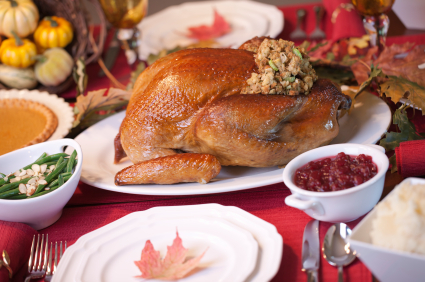A Thanksgiving Prayer
. . . just days before we celebrate our thankfulness with a holiday meal, may we remember those who are
-too poor to have a table
-too feeble to walk to the table,
-too confused to remember why we gather at the table,
-too estranged from family to come to the table,
-too distracted to recognize the beauty of the faces around our table.
Help us to remember Lord, when we gather to share a meal,
we are invited to be imitators of your table fellowship,
where all have a place,
all are invited,
all are loved, and all are fed.
~~ Pastoral Prayer, Glading Memorial Church
Philadelphia, Pa., November 18, 2012, by Judith Brackett
I have a friend who knows how to prepare a meal. Now, I mean she really knows. But her knowledge isn't measured by extravagance, or expense, or gluttonous volume. Her knowledge is measured by putting just the right thing with just the right thing, all in just the right place. The right olives next to the right melon slices, which are next to the right sliced meats. Hummus. The surprise of a walnut when you might not  have expected it. Dill and freshly steamed beets with goat cheese crumbles--rounded perhaps by sprinkles of lemon juice. Or maybe something much simpler, even surprisingly ordinary. It's not the perfection of the cuisine; it's the fashioning of the food for the guests she's called to her table. No attention called to the creation, she even asks her guest to help her prepare--treating them as if they're family (because that's what they become).
have expected it. Dill and freshly steamed beets with goat cheese crumbles--rounded perhaps by sprinkles of lemon juice. Or maybe something much simpler, even surprisingly ordinary. It's not the perfection of the cuisine; it's the fashioning of the food for the guests she's called to her table. No attention called to the creation, she even asks her guest to help her prepare--treating them as if they're family (because that's what they become).
I actually loved the fact that she went out and found, and then read, a book I once quoted in a sermon she happened to hear me preach one Sunday. (How many people do that?) The book was by an Episcopalian theologian and part-time cooking columnist (or is that cooking columnist and part-time theologian?) Robert Farrer Capon. The book was the first of his two theological cookbooks, called The Supper of the Lamb. It's an old book now. Likely out of print. But it's worth a grab from a used book table, if you can find it. In this book Capon tells you what to do 15 minutes before your guests arrive, whether you're prepared for them or not. Stop, he says. Pour yourself a glass of wine. Maybe put some music on. Sit. Sip. Turn your head. Begin. And when the doorbell rings, welcome your friends into something already started. "Why?" he rhetorically asks. Because like in God coming among us in Christ, like the father welcoming the child in his parable of the prodigal son, like the communion Jesus shared with his disciples before his arrest, "the party begins not in the guests; the party begins in the host." So if you bring them into the kitchen and put them to work, it's not because you're late. It's because they've been there all along—first in spirit, now in body.
My friend took that advise to heart and quotes it back to me now and then, probably because it gives words to something she's known for years.
My friend also wrote the prayer with which I began this Thanksgiving message. There's a glimpse of the eternal party that's already begun, and that waits for each one of us.
May your Thanksgiving be more than a day off. May it be other than labor to prepare a meal. May it be surprisingly unscripted. And may it sit you down, turn your head, and let you begin where God has already started. May it be the beginning.
